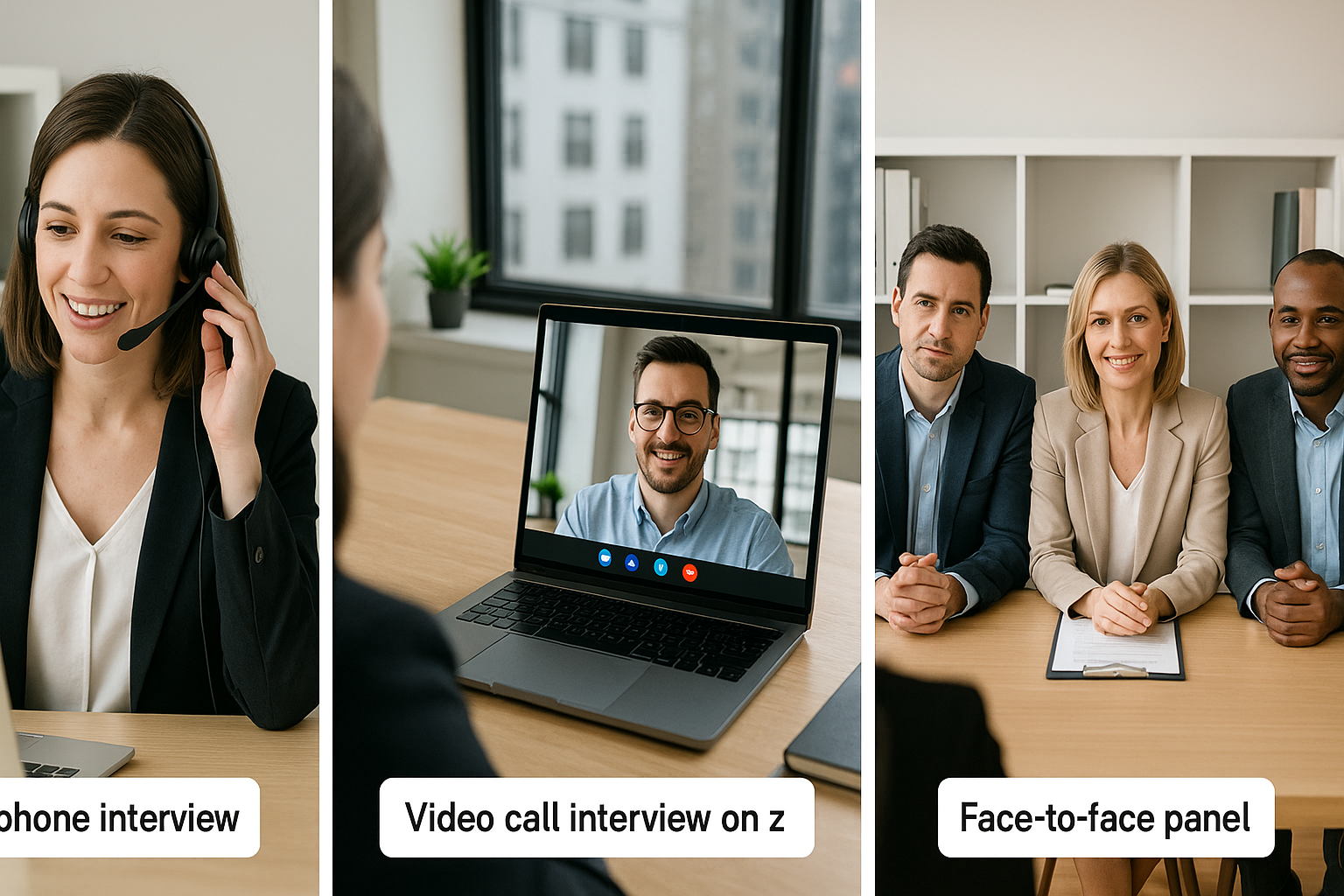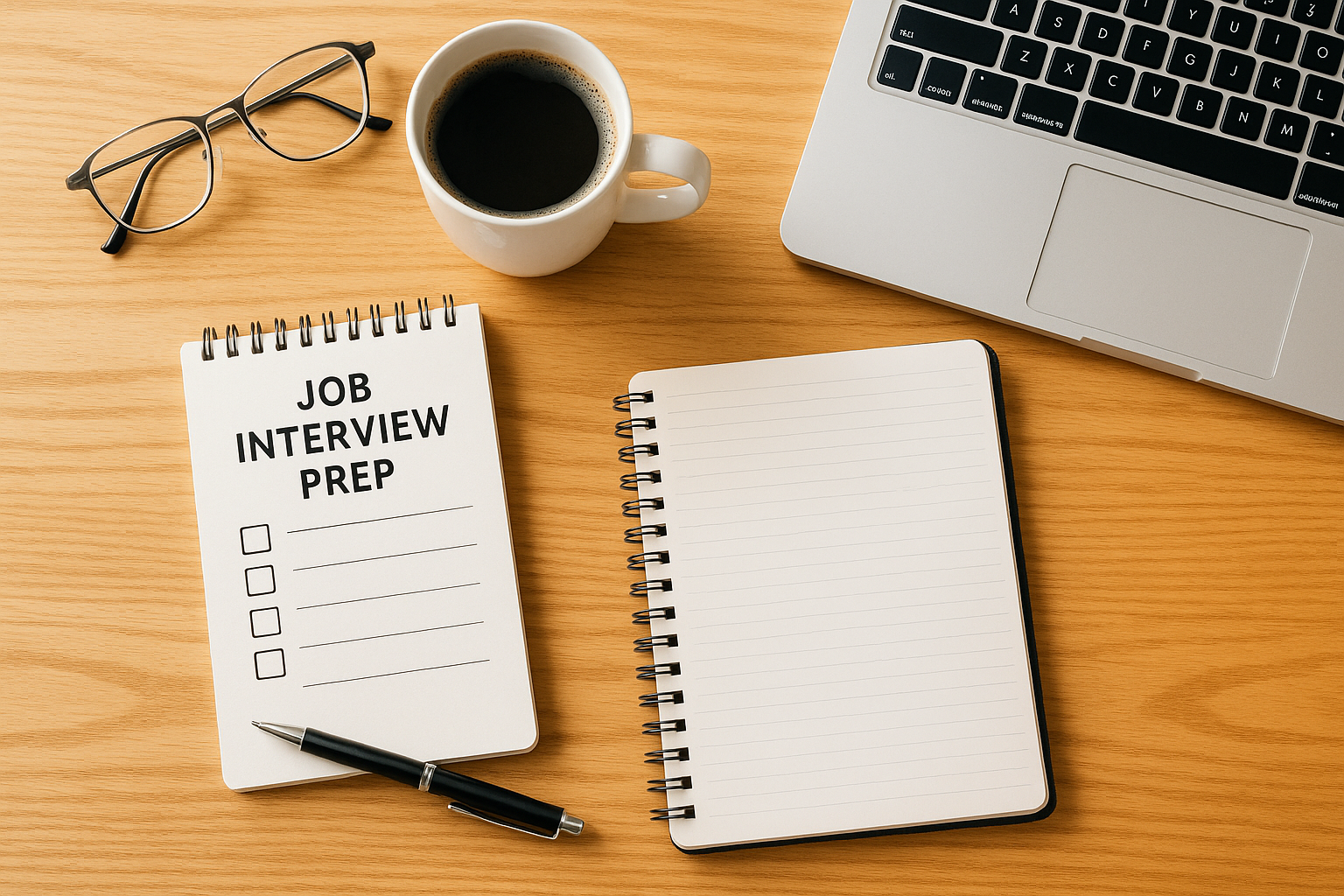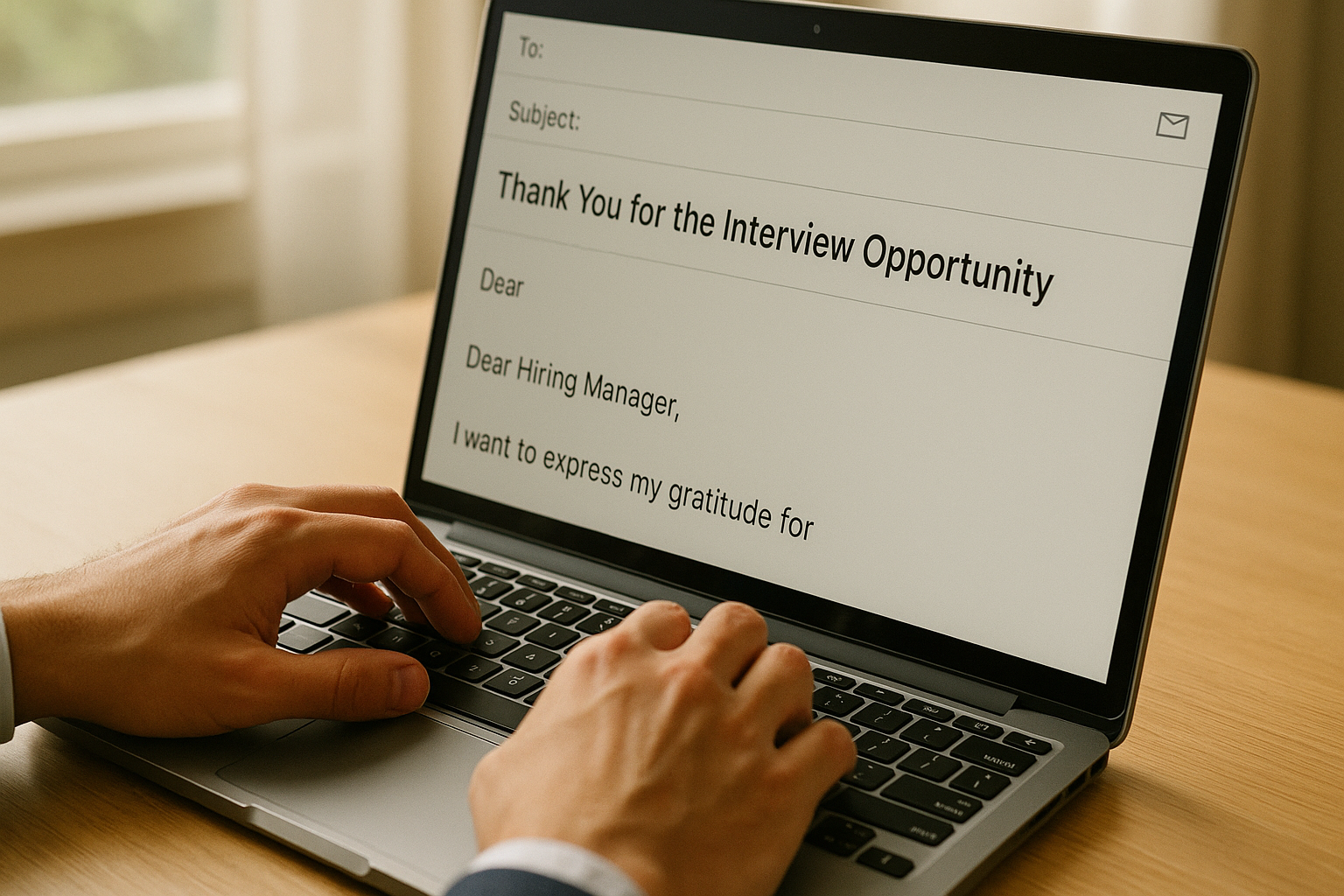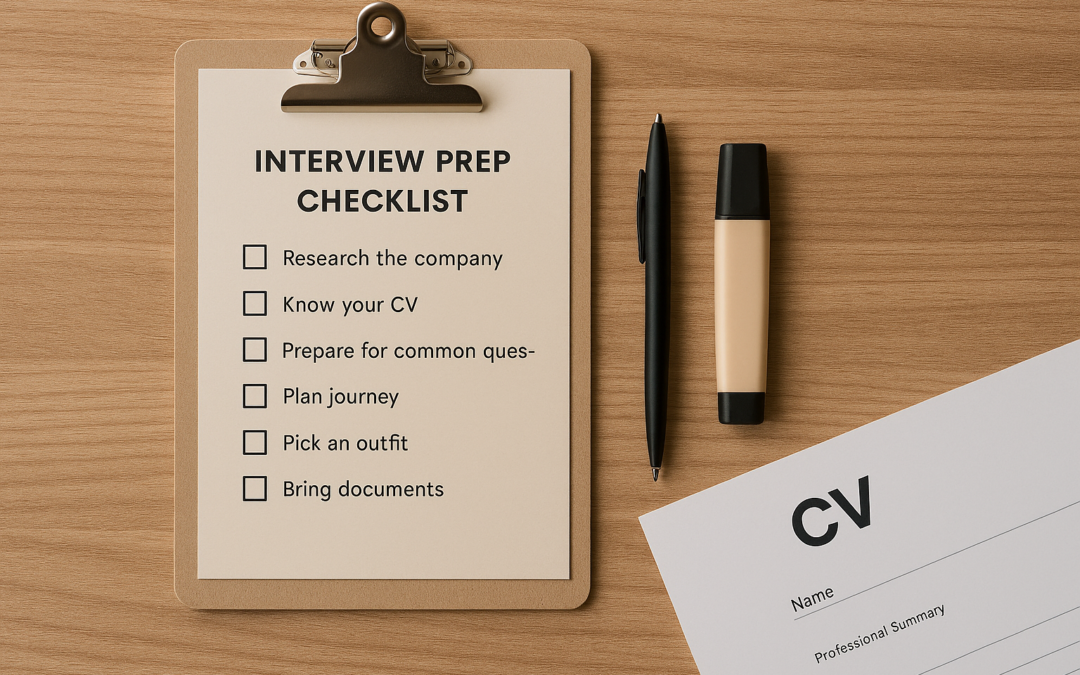Introduction: Why Interview Preparation Matters in the UK
In today’s highly competitive job market, knowing how to prepare for a job interview in the UK can be the difference between receiving an offer and being overlooked. Whether you’re stepping into your first professional role, changing careers, or returning after a break, proper interview preparation builds your confidence and gives you a clear edge in every conversation.
But here’s the twist, UK interviews aren’t just about qualifications. Employers are looking for cultural fit, professionalism, and clear communication. This guide breaks down every step of the process, from research and etiquette to answering tricky questions and following up like a pro.
We’ll also explore how interviews differ in the UK compared to other countries, what to expect in 2025 and beyond, and how to stay calm under pressure. If you want to feel prepared, empowered, and ready to convert more interviews into job offers, this is your complete roadmap.
What Makes UK Job Interviews Unique?
UK job interviews follow a professional but polite tone, shaped by workplace etiquette, structure, and cultural expectations. Understanding these nuances is key to making a strong impression, especially if you’re transitioning from another country or new to the workforce.
For starters, British employers often place a strong emphasis on punctuality, preparation, and politeness. You’re expected to arrive early, greet interviewers with a firm handshake or professional virtual presence, and maintain a calm, confident tone throughout the conversation.
Another notable trait? The preference for competency-based questions. Unlike more casual styles in other regions, UK interviews frequently use structured formats designed to assess how you’ve demonstrated key skills in the past, typically using the STAR method. You’re not just asked what you did, but how you did it, what challenges you faced, and what outcomes you achieved.
Additionally, there’s often a two- or three-stage process, beginning with a screening call and progressing to panel interviews, technical assessments, or final interviews with senior management. Each step requires its own level of polish and preparation.
Finally, UK employers often value humility paired with self-awareness. Confidence is good, but boastfulness or overselling can feel off-putting. Instead, focus on clear, evidence-backed responses that show your value and your fit with their company culture.
By understanding and embracing these unique elements, you’ll enter your next interview not just prepared, but fully aligned with what UK employers expect in 2025 and beyond.
Types of Interviews in the UK (2025 Edition)

Here are the most common interview formats you’ll encounter in the UK job market:
- Telephone Interviews: Often used for first-round screenings. Expect questions about your CV, availability, and interest in the role. Keep your notes handy and speak clearly.
- Virtual Interviews (Zoom/Teams): Now standard across many industries. Ensure good lighting, a tidy background, and a professional presence on camera.
- In-Person Interviews: Still common for second or final rounds. Focus on body language, dress code, and building rapport in person.
- Panel Interviews: You’ll meet with two or more interviewers at once. Each person may focus on a different area, such as technical skills or cultural fit.
- Competency-Based Interviews: Structured around questions that test specific behaviours and skills using real-life examples. The STAR method is essential here.
- Assessment Centres: Popular for graduate schemes or large organisations. You’ll complete group tasks, written exercises, or presentations over a full or half day.
- Technical Interviews: Common in IT, finance, and engineering. Expect to solve problems or demonstrate your technical abilities live or in advance.
The best way to prepare? Ask what format to expect when you’re invited for the interview. Most recruiters will tell you, and that knowledge gives you a head start.
How to Prepare for a Job Interview UK

Preparation is the secret to interview success. It helps you stay calm, confident, and ready to turn every question into an opportunity. In the UK, employers expect candidates to show they’ve done their homework, not just about the job, but the company, the culture, and the industry.
Follow this smart preparation checklist to get fully interview-ready:
- Revisit the job description: Highlight keywords, responsibilities, and desired skills. Think about how your experience aligns with their needs.
- Research the company: Visit their website, read their mission statement, recent news, LinkedIn updates, and Glassdoor reviews.
- Understand the interview format: Know whether it’s virtual, panel-based, or includes technical tasks so you can tailor your prep.
- Prepare key examples using STAR: Structure your responses with Situation, Task, Action, and Result. Aim for at least 4–6 ready-made examples.
- Practice common questions: Say your answers out loud, record yourself, or do a mock interview with a friend.
- Plan your outfit: Whether remote or in-person, dressing professionally puts you in the right mindset and makes a great impression.
- Prep questions to ask them: Great candidates ask insightful questions. It shows curiosity and professionalism.
The more you prepare, the more control you’ll feel in the room. You’re not just hoping for the best; you’re actively showing why you’re the best choice for the job.
If you feel you need help with interview preparation, we can help with a virtual, one-to-one mock interview session!
Nervous about your next interview? Let’s fix that.
Work 1:1 with Brendan Hope’s specialist coaching team and walk into your next interview fully prepared and confident.
👉 Book Your Interview Coaching Session Today
Researching the Company and Role
In the UK, hiring managers expect you to walk into an interview with a clear understanding of who they are and what they do. Failing to research the company is a top reason why candidates get rejected, because it signals a lack of preparation or genuine interest.
Research allows you to tailor your answers, build rapport, and show how your values align with theirs. Here’s how to do it the right way:
- Start with their website: Read their About page, services, recent blog posts, and team bios.
- Check LinkedIn: Look at their company profile, recent activity, and employee posts. Try to find your interviewer’s profile to better understand their background.
- Look up recent news: Use Google News to find any coverage, launches, partnerships, or awards.
- Understand their tone and culture: Is it formal and corporate or creative and relaxed? Mirror that tone in your interview responses.
- Review the job description again: Connect their stated needs to your experience and achievements.
When you reference something specific, like a campaign they launched or an award they won, it tells the interviewer: “This person gets us.” That’s a powerful differentiator.
Career coaching may help you to identify the correct path and companies to focus on.
Decoding the Job Description Like a Pro
Job descriptions are more than just a list of tasks, they’re a roadmap to interview success. In the UK, employers often embed key clues into job ads that reveal exactly what they want to hear in an interview. If you learn how to read between the lines, you can tailor your responses with laser precision.
Here’s how to break down any UK job description effectively:
- Highlight key responsibilities: These are the core tasks you’ll be asked about. Think of examples that prove you’ve done similar work before.
- Underline repeated phrases or keywords: Terms like “collaborative,” “deadline-driven,” or “customer-focused” show what traits they value most.
- Look for required vs. desirable skills: Prioritise examples that align with essential requirements, but prepare to speak confidently about any “bonus” skills too.
- Check for cultural clues: Phrases like “fast-paced team,” “flat hierarchy,” or “entrepreneurial environment” give insight into their working style.
- Match your CV to the advert: Make sure your achievements and responsibilities echo the language used in the job description, this shows instant alignment.
Understanding the job advert on this deeper level helps you focus your prep and demonstrate a strong fit in both your answers and the questions you ask them.
How to Dress for a Job Interview in the UK
Your appearance makes a first impression long before you start speaking. In the UK, dressing appropriately for the role and the company shows you’ve done your homework, and that you respect the process. Whether the interview is virtual or in-person, the right outfit can help you feel confident and ready.
Here are UK-specific tips to help you dress the part:
- Research the company culture: Corporate firms (finance, legal, consulting) usually expect formal business attire. Startups, creative agencies, or tech firms often lean smart-casual.
- When in doubt, dress slightly more formal: It’s better to be slightly overdressed than underdressed, especially for first interviews.
- Keep colours neutral and accessories minimal: Navy, grey, white, and black are safe choices. Avoid flashy jewellery or logos.
- Grooming matters: Neat hair, tidy nails, clean shoes, and fresh breath all contribute to a polished presentation.
- For virtual interviews: Wear full professional dress, even the bottom half. You never know when you’ll need to stand up!
Ultimately, your outfit should support your message, not distract from it. Show them you’re serious, prepared, and ready to fit in with their environment.
Must-Know UK Interview Etiquette
In the UK, professionalism, punctuality, and politeness are non-negotiables in the interview room. Even if you ace the technical questions, a slip in etiquette can impact your chances. That’s why understanding cultural expectations, and practising good manners, can go a long way.
Follow these etiquette tips to make a great impression:
- Be on time, or early: Aim to arrive 10 minutes early for in-person interviews, or log in 5 minutes early for virtual ones. Being late is a major red flag.
- Use professional greetings: Start with a firm handshake (in person) or a confident “Good morning/afternoon” (virtual), and always use their name if known.
- Be polite and composed: Use “please” and “thank you” where appropriate, avoid interrupting, and maintain eye contact without staring.
- Switch your phone off: Or at the very least, silence notifications. Distractions during an interview can come off as careless or disinterested.
- Don’t speak negatively about past employers: Even if your last job ended badly, stay diplomatic. UK employers value tact and professionalism.
- Follow up with a thank-you note: It’s not just polite, it shows emotional intelligence and can keep you top of mind.
By respecting UK norms and bringing your best self to the table, you’ll show that you not only have the skills, but the right attitude too.
Top 10 Common Interview Questions in the UK
While every job interview is different, many UK employers rely on tried-and-tested questions to assess your skills, mindset, and cultural fit. Preparing for these questions in advance will help you avoid awkward silences and respond with confidence and clarity.
Here are the most frequently asked UK interview questions in 2025:
- “Tell me about yourself.”
Give a brief overview of your background, key achievements, and why you’re excited about this role. - “Why do you want to work here?”
Show that you’ve researched the company and align with their mission and values. - “What are your strengths and weaknesses?”
Choose strengths relevant to the role and frame weaknesses as areas of improvement with examples. - “Describe a time you solved a problem.”
Use the STAR method to walk them through a real-life solution. - “Tell us about a challenge you’ve overcome.”
Highlight resilience and adaptability with a positive outcome. - “How do you handle pressure or tight deadlines?”
Give an example where you stayed calm, organised, and met expectations. - “What do you know about our company?”
Impress them by mentioning recent projects, news, or values they promote. - “Where do you see yourself in five years?”
Link your career goals with the potential growth you see in this role or company. - “Why did you leave your last role?”
Keep it professional and positive, focusing on growth, new challenges, or relocation. - “Do you have any questions for us?”
Always say yes, ask about the team, company goals, or what success looks like in the role.
These questions are your chance to tell your story in a structured, compelling way. Be honest, be prepared, and most of all, be yourself.
Using the STAR Technique to Answer Like a Pro
Many UK employers use behavioural and competency-based interview questions. They want real examples of how you’ve handled situations in the past, because it’s one of the best predictors of how you’ll perform in the future. That’s where the STAR method comes in.
STAR stands for:
- S – Situation: Set the scene. Describe the context of the story.
- T – Task: Explain the challenge or responsibility you faced.
- A – Action: Detail what you did, focus on your contribution, not the team’s.
- R – Result: Share what happened. Quantify your impact if possible.
Example Question: “Can you give an example of when you worked under pressure?”
Situation: During my previous role as an events coordinator, a key speaker cancelled just 24 hours before a major conference.
Task: I was responsible for finding a replacement and ensuring the schedule wasn’t disrupted.
Action: I contacted industry contacts, sourced a new speaker, and updated all promotional materials overnight.
Result: The event went ahead smoothly, and attendee feedback on the speaker was overwhelmingly positive.
Practice 4–6 STAR stories in advance covering different competencies: teamwork, leadership, problem-solving, communication, adaptability, and conflict resolution. You’ll enter any UK interview with a toolkit of impactful responses ready to go.
Handling Tricky Questions With Confidence
No matter how prepared you are, there’s always that one question that catches you off guard. In the UK, tricky questions aren’t designed to trip you up, they’re used to test your thinking, self-awareness, and communication under pressure. The key is to stay calm, take a breath, and answer honestly with a structured response.
Common tricky questions and how to handle them:
- “What’s your biggest weakness?”
Choose a genuine area you’ve worked to improve. Show growth, not perfection. - “Tell me about a time you failed.”
Pick an example with a positive ending, what you learned and how it changed your approach. - “Why should we hire you over other candidates?”
Focus on your unique mix of experience, attitude, and cultural fit. Keep it humble, but confident. - “Why is there a gap in your CV?”
Be honest, then steer the focus to how you’ve stayed proactive, volunteering, learning, or freelancing all count. - “Tell us about a conflict you had at work.”
Use STAR to show how you handled the situation maturely and professionally.
Don’t be afraid to pause and collect your thoughts, it shows composure. And remember, it’s okay to say, “That’s a great question, let me think about that for a moment.” Confidence isn’t about having all the answers instantly. It’s about responding with clarity and honesty, even under pressure.
Virtual Interviews: Tips for Zoom, Teams & Beyond

Virtual interviews have become the norm across the UK, especially for early-stage or remote-friendly roles. Whether you’re using Zoom, Microsoft Teams, or Google Meet, it’s essential to treat video interviews with the same level of preparation and professionalism as an in-person meeting.
While convenient, virtual interviews come with their own challenges, tech issues, camera presence, and maintaining engagement without the benefit of body language. But with a little planning, you can turn a video call into a seamless, standout experience.
Follow these virtual interview tips to stand out on screen:
- Test your tech: Check your internet, audio, and webcam the day before. Close all unnecessary tabs or apps to avoid lags.
- Set the scene: Choose a quiet, clutter-free background with good lighting. Face a window or place a soft light in front of you.
- Dress the part: Wear the same outfit you would to an in-person interview. It boosts your confidence and keeps things professional.
- Maintain eye contact: Look at the camera, not your screen. It creates the illusion of direct eye contact with the interviewer.
- Use notes wisely: It’s okay to have talking points nearby, but avoid reading word-for-word or sounding scripted.
- Eliminate distractions: Silence your phone, inform housemates or family, and turn off notifications on your computer.
After the interview, send a follow-up thank-you email just as you would with an in-person meeting. In a virtual world, thoughtful touches still matter, and they help keep you memorable long after the call ends.
Body Language & Communication Tips

What you say in an interview matters, but how you say it can matter just as much. In the UK, body language plays a subtle yet significant role in how your confidence, professionalism, and enthusiasm are perceived.
From eye contact to posture, your non-verbal cues give interviewers clues about your mindset. Mastering these soft skills will help you build trust and create a positive first impression, whether you’re meeting face-to-face or virtually.
Key body language tips to project confidence and authenticity:
- Maintain eye contact: This shows interest and honesty. Don’t overdo it, just aim for steady, natural contact throughout.
- Sit up straight: Good posture signals confidence and energy. Avoid slouching or leaning too far forward.
- Smile genuinely: A warm smile can break the ice and set a positive tone from the start.
- Use hand gestures thoughtfully: Use open, relaxed movements to support your points. Avoid crossing your arms or fidgeting.
- Mirror the interviewer: Subtly matching their pace, tone, or gestures can build unconscious rapport (just don’t mimic them overtly).
- Be mindful of nervous habits: Things like tapping, hair twirling, or shifting in your seat can distract or undermine your presence.
Remember: the goal isn’t to perform, it’s to connect. Body language should complement your message and reflect your enthusiasm for the role. When words and gestures align, you create a powerful impression that lasts.
Asking Insightful Questions as a Candidate
At the end of most UK interviews, you’ll be asked, “Do you have any questions for us?” This isn’t just a formality, it’s your chance to show critical thinking, curiosity, and confidence. The questions you ask can leave a lasting impression and even shape how the interviewer sees your potential.
Asking smart, well-researched questions demonstrates that you care about more than just getting the job, you want to make sure it’s the right fit for you too.
Great questions to ask during a UK interview:
- “What does success look like in this role over the first six months?”
- “Can you describe the team I’d be working with?”
- “What are the biggest challenges facing this department right now?”
- “How would you describe the company culture here?”
- “What opportunities are there for growth or development?”
- “Is there anything about my CV or interview you’d like me to expand on?”
Avoid asking about salary or holiday entitlement in the first interview unless prompted. These topics are better left for second interviews or offer discussions.
End with a thoughtful, open-ended question that reflects your long-term interest. You’ll come across as professional, engaged, and already thinking like someone on the team.
Follow-Up Etiquette After an Interview

Following up after a job interview is more than polite, it’s a strategic move. In the UK, a thoughtful thank-you message shows professionalism, reinforces your interest in the role, and gives you one more opportunity to leave a positive impression. And yet, many candidates skip this simple but effective step.
Whether your interview was virtual or in person, timely follow-up helps you stand out in a competitive market. It also keeps the conversation going, and shows you value the interviewer’s time.
Best practices for post-interview follow-up in the UK:
- Send a thank-you email within 24 hours: Keep it short, sincere, and specific. Mention something you appreciated or learned during the interview.
- Restate your interest: Reinforce why you’re a great fit for the role and why you’re excited about the opportunity.
- Clarify or expand: If you missed anything or want to elaborate on a point, this is a great time to do so.
- Be professional, not pushy: Avoid asking for a decision or timeline unless it was mentioned during the interview.
Example: “Thank you again for the opportunity to interview for the Marketing Executive position. I really enjoyed our discussion about your recent brand campaign and would be excited to contribute my content strategy experience to similar projects. Please let me know if there’s anything else I can provide in the meantime.”
A simple follow-up can speak volumes. It’s a small action with the power to leave a lasting, professional impression, and it might just be the nudge that helps you land the role.
How to Stay Confident and Calm Under Pressure
Job interviews can be nerve-racking, even for the most experienced professionals. In the UK, where employers value composure and self-awareness, staying calm under pressure is key to delivering your best performance. The good news? Confidence isn’t something you have or don’t have, it’s something you can build.
Confidence in interviews doesn’t mean having all the answers. It means being comfortable with what you know, prepared for what you don’t, and able to adapt in the moment. Here’s how to stay grounded, even when nerves kick in.
Strategies to build calm, quiet confidence:
- Prepare like a pro: Knowing your STAR stories, the company’s mission, and the job spec gives you a foundation to stand on.
- Practice out loud: Rehearse answers with a friend, coach, or even in front of a mirror. It helps solidify your delivery.
- Breathe intentionally: Before and during the interview, slow your breathing to calm your nervous system.
- Use positive visualisation: Picture the interview going well. Imagine yourself smiling, connecting, and leaving feeling proud.
- Reframe anxiety: Nervousness and excitement feel the same physically, your body’s just gearing up for performance. Channel that energy positively.
Even if your voice shakes or you forget a line, that’s okay. Authenticity resonates far more than perfection. The more you prepare and practise, the more natural confidence you’ll project when it matters most.
Interview Mistakes That Cost UK Candidates the Job
Sometimes, it’s not what you say, but what you overlook, that can make or break your interview. UK employers are trained to spot subtle signs of unpreparedness or poor fit. By avoiding common pitfalls, you can keep your interview on track and leave a strong, professional impression.
These mistakes are surprisingly easy to make, but also easy to avoid with the right preparation and mindset.
Common UK interview mistakes to steer clear of:
- Arriving late or flustered: Timekeeping is essential. Arrive early and log in ahead of time if it’s a virtual interview.
- Not researching the company: Employers expect you to know their mission, services, and recent updates. Lack of research signals a lack of effort.
- Giving vague or generic answers: Use real examples and structure your responses with the STAR method for clarity and impact.
- Oversharing or rambling: Stay focused on the question. Practise being concise and to the point.
- Badmouthing previous employers: Always stay professional, even if your last role ended poorly. Negativity reflects more on you than them.
- Not asking questions at the end: Skipping this makes you seem disinterested. Come prepared with thoughtful questions to show engagement.
Every interview is a learning experience. Reflect after each one, fine-tune your approach, and keep growing. Avoiding these common traps can make the difference between almost getting the job, and getting the offer.
🚀 Ready to Turn Interviews into Offers?


Recent Comments